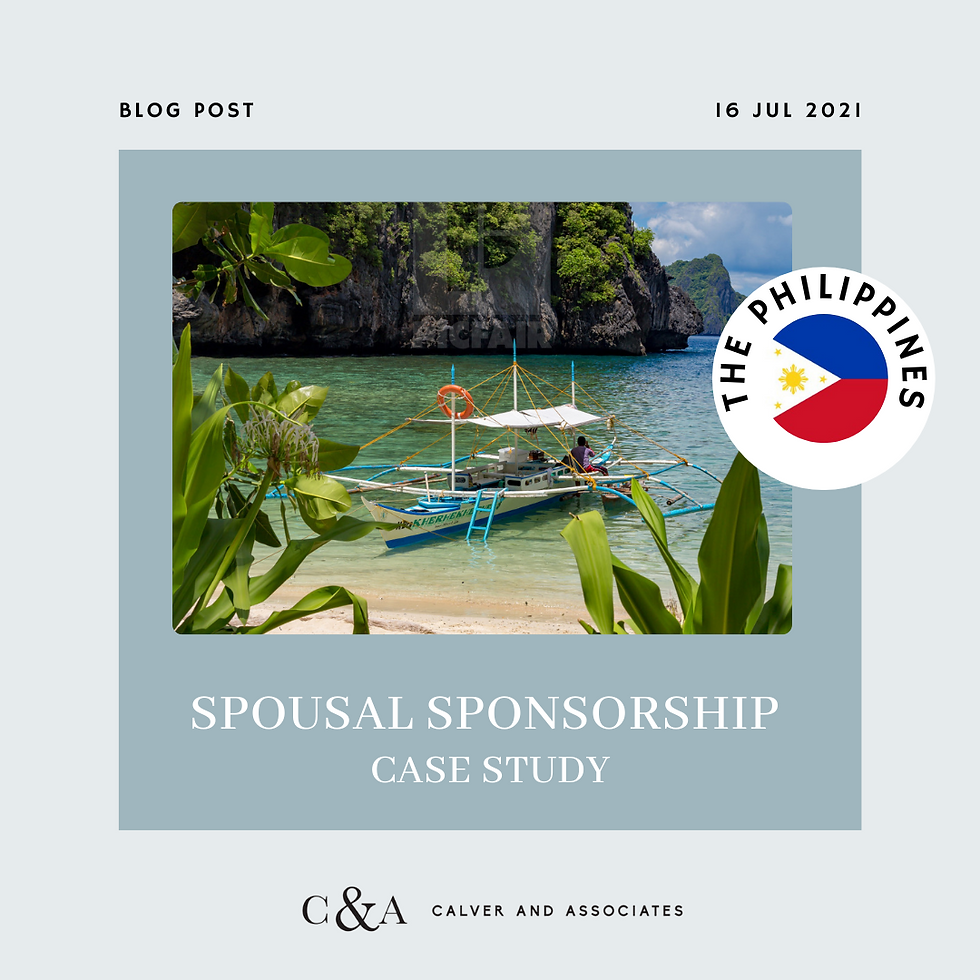Spousal Sponsorship Case Study | The Philippines
- Calver Immigration Consulting Inc.
- Jul 16, 2021
- 4 min read
The Canadian Government offers a Family Class Sponsorship pathway to permanent residency for non-Canadians who have Canadian spouses or family members. Many of our clients are Canadian citizens looking to sponsor their spouses or partners who hold Filipino citizenship. While Canada’s spousal sponsorship program does not discriminate based on country of origin, we’ve found that the process can sometimes be more complicated for a Filipino being sponsored to Canada. As such, we have put together a case study guide for Canadian citizens or permanent residents who wish to sponsor their Filipino spouse.

Getting Married to a Filipino National
Getting a travel visa for your Filipino spouse to come to Canada can be difficult. As a result, we typically see our community and clients travel to the Philippines to marry their partner. Canadian citizens who wish to marry non-Canadians in the Philippines must follow specific directives so that their marriage will be recognized:
Obtain a Certificate of Legal Capacity to Contract Marriage from the Canadian Embassy or Consulate in the Philippines before filing an application for a marriage license.
Prepare an Affidavit to attest that you are legally capable to marry. Said Affidavit must be notarized in the Philippines by a notary public.
Submit Affidavit with all other required documents to the Local Civil Registrar’s Office.
Not all Local Civil Registry Offices will accept the Affidavit; it is your responsibility to find one that does and adjust accordingly.
Furthermore, the Affidavit must be issued within six months of the date of marriage.
If the Canadian spouse holds only permanent residency status, not Canadian citizenship, they may need to obtain a declaration from the Canadian Embassy or Consulate in the Philippines to confirm their nationality.
If the Canadian partner has been previously married, they must ensure that their divorce is recognized in the Philippines as this is not automatically guaranteed. This partner should seek legal advice or contact the Philippine Statistics Authority.
Pay appropriate fees.
Options for Same-Sex Couples
Unfortunately, we must note that same-sex marriage is not yet legally recognized in the Philippines. However, this does not mean that Canadian spousal sponsorship is impossible for same-sex couples. Under Canadian Immigration law, there are 3 types of "marital status" defined within the Immigration Act: married couples (spouses), common-law partners, and conjugal partners. Conjugal partner status allows for those in marriage-like relationships to be sponsored. In order to obtain this status, a couple must show that the other two categories (spouse and common-law) are not possible to qualify for. For example, if the Filipino partner cannot get a travel visa to marry elsewhere where same-sex marriages are legal, and the Canadian partner can’t live with them common-law in the Philippines, then the couple can claim conjugal partnership and still apply for sponsorship.

Once married
Once a Canadian and Filipino resident or citizen are married, they are eligible to submit a spousal sponsorship application to return to Canada. The process typically takes twelve months in total for an application to be approved.
Note that this application is paper-based
Submit documents
For sponsor:
For person being sponsored (principal applicant):
Generic Application Form for Canada [IMM 0008] (PDF, 652 KB)
Additional Dependants/Declaration [IMM 0008DEP] (PDF, 433.80 KB)
Schedule A – Background/Declaration [eIMM 5669] (PDF, 597.99 KB)
Original birth certificate issued by the Philippines Statistics Authority (PSA) and printed on PSA paper (if birth certificate was issued in the Philippines)
Either a Certificate of no record of marriage (CENOMAR) to establish that there is no record of marriage, or a Philippine Statistics Authority (PSA) Advisory on Marriages providing details about any marriages registered in the Philippines (if you hold a Philippine passport)
Original marriage certificate issued by the Philippines Statistics Authority (PSA) and printed on PSA paper (if marriage certificate was issued in the Philippines)
Provide biometrics
Give your fingerprints and photo.
Submit by mail
Address for spouses outside of Canada: CPC Sydney P.O. Box 9500 Sydney NS, B1P 0H5
Address for spouses living in Canada: CPC Mississauga P.O. Box 5040, Station B Mississauga, ON, L5A 3A4
Link application to your online account

What We’ve Learned from Submitting Applications from the Philippines
A medical exam is required in addition to other biometrics
Interviews are common when applying
Documents from the Philippines must be printed on PSA paper. If births are registered late, additional documents must be submitted.
Divorce is not recognized in the Philippines, and can complicate applications.
Authorities in the Philippines may not accept documents written in French.
The sponsored Filipino national will need to apply and attend a Pre-Departure Orientation Seminar in order to be able to leave the country once approved for Permanent Residency.
Our Services
Calver and Associates is a leading provider of Canadian Immigration services in Durham Region. We serve clients in Oshawa, Whitby, Ajax, and beyond. Our Registered Canadian Immigration Consultant has over 10 years of experience in Canadian Immigration law and over four years of experience serving those in the Oshawa area.
We can provide assistance with applications for both temporary and permanent residency in Canada. We handle applications for study permits, permanent residency, family class sponsorship, visitor visas, work permits, and Canadian citizenship. We also handle criminal inadmissibility cases by developing remedies for refusal.


Comments